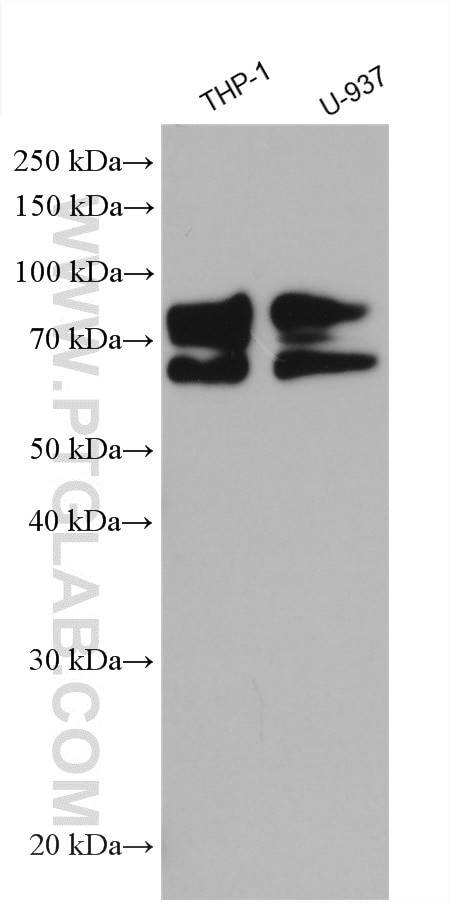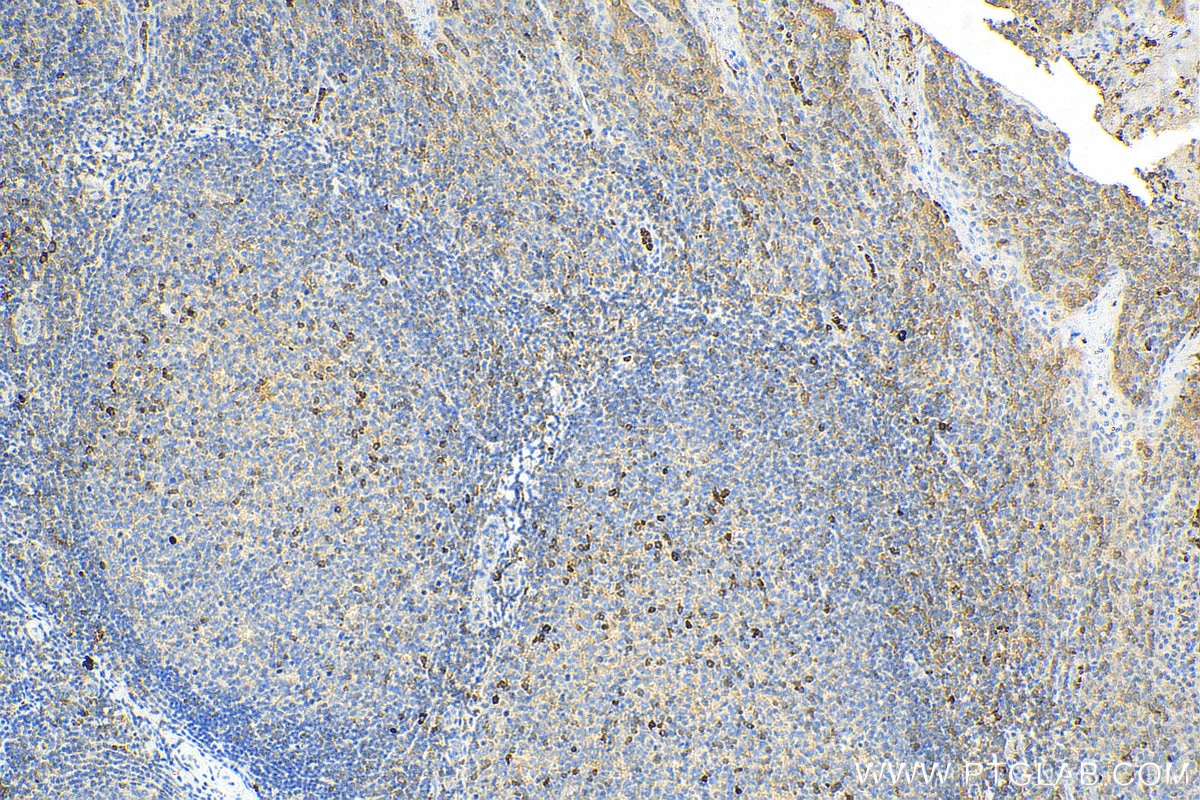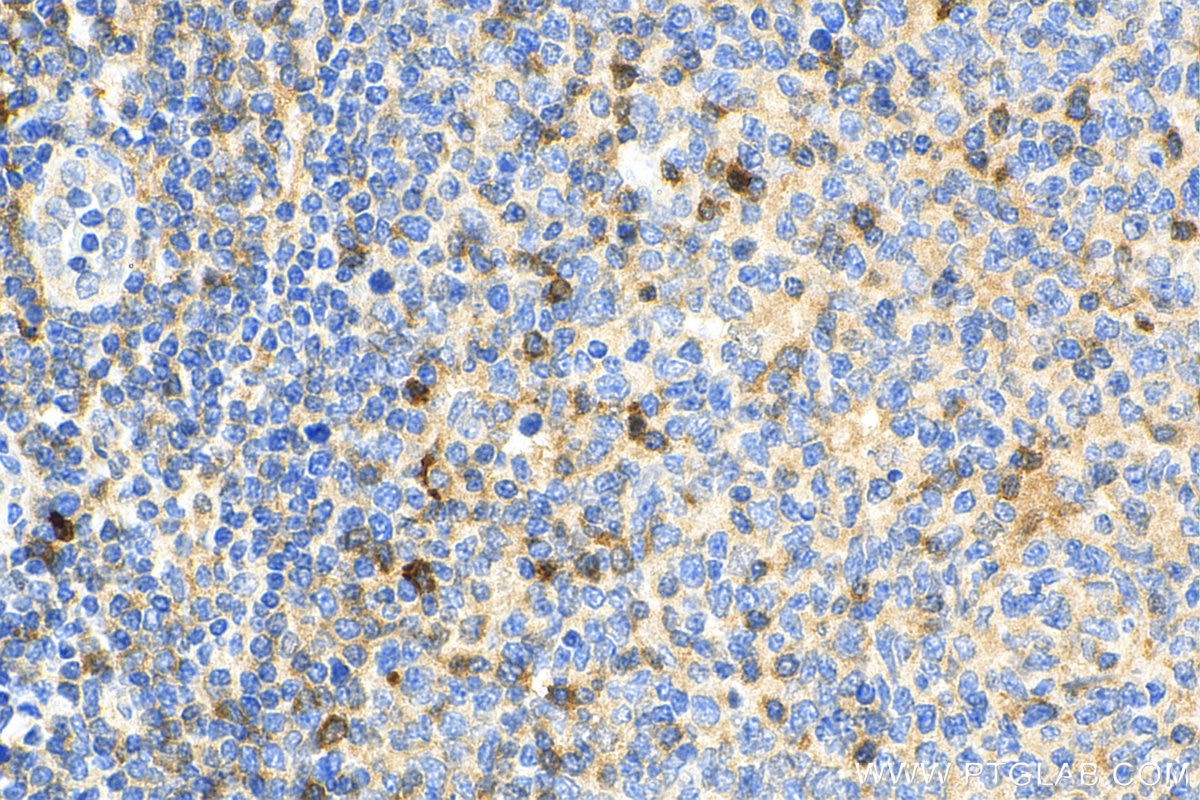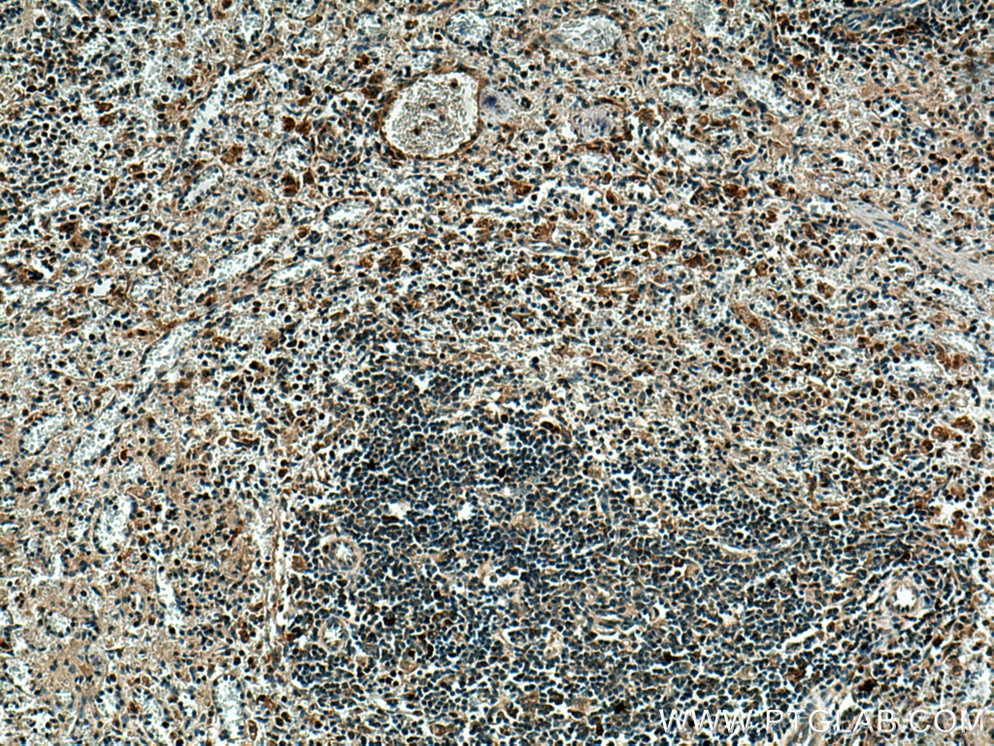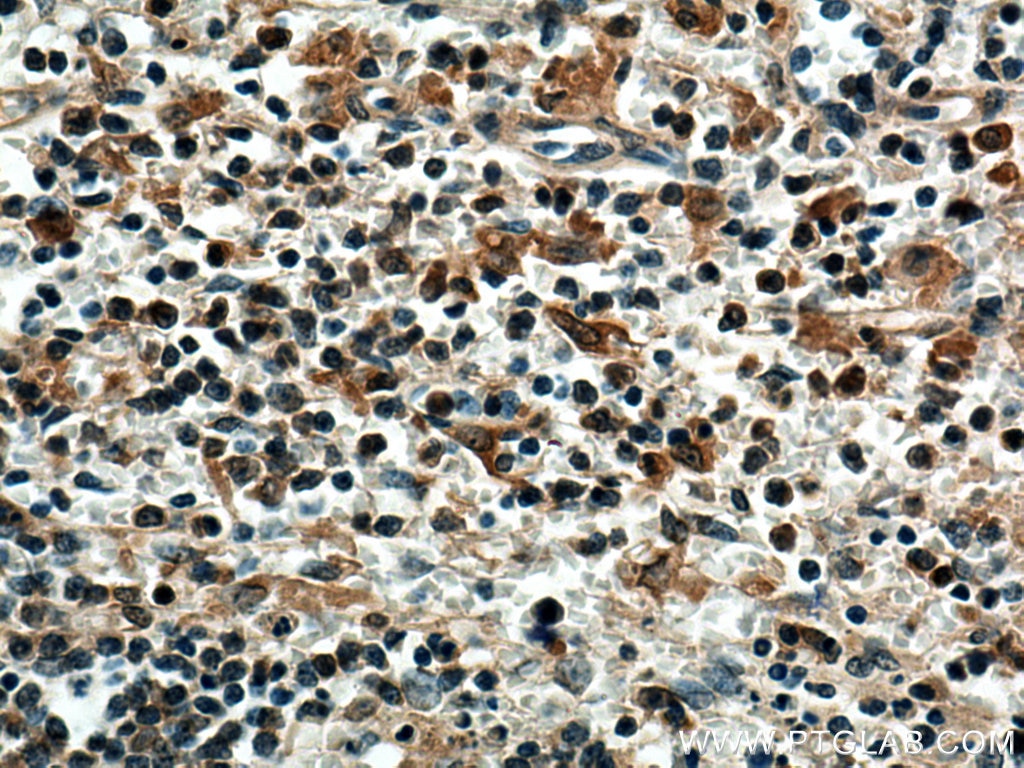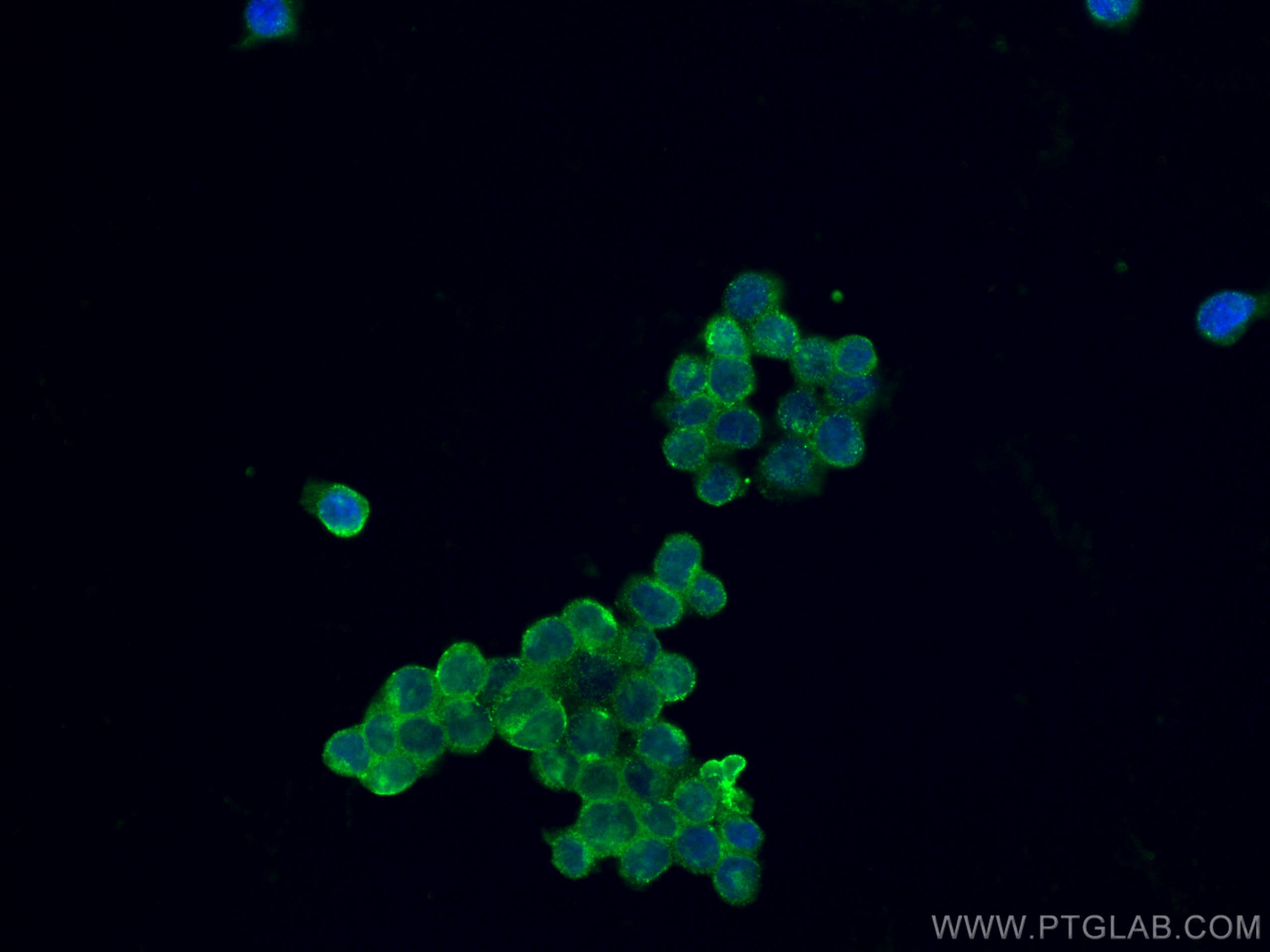TNFR2/CD120b Polyklonaler Antikörper
TNFR2/CD120b Polyklonal Antikörper für WB, IHC, IF/ICC, ELISA
Wirt / Isotyp
Kaninchen / IgG
Getestete Reaktivität
human
Anwendung
WB, IHC, IF/ICC, ELISA
Konjugation
Unkonjugiert
Kat-Nr. : 28746-1-AP
Synonyme
Geprüfte Anwendungen
| Erfolgreiche Detektion in WB | THP-1-Zellen, U-937-Zellen |
| Erfolgreiche Detektion in IHC | humanes Tonsillitisgewebe, humanes Milzgewebe Hinweis: Antigendemaskierung mit TE-Puffer pH 9,0 empfohlen. (*) Wahlweise kann die Antigendemaskierung auch mit Citratpuffer pH 6,0 erfolgen. |
| Erfolgreiche Detektion in IF/ICC | THP-1-Zellen |
Empfohlene Verdünnung
| Anwendung | Verdünnung |
|---|---|
| Western Blot (WB) | WB : 1:1000-1:5000 |
| Immunhistochemie (IHC) | IHC : 1:50-1:500 |
| Immunfluoreszenz (IF)/ICC | IF/ICC : 1:50-1:500 |
| It is recommended that this reagent should be titrated in each testing system to obtain optimal results. | |
| Sample-dependent, check data in validation data gallery | |
Veröffentlichte Anwendungen
| WB | See 1 publications below |
| IHC | See 2 publications below |
| IF | See 2 publications below |
Produktinformation
28746-1-AP bindet in WB, IHC, IF/ICC, ELISA TNFR2/CD120b und zeigt Reaktivität mit human
| Getestete Reaktivität | human |
| In Publikationen genannte Reaktivität | human |
| Wirt / Isotyp | Kaninchen / IgG |
| Klonalität | Polyklonal |
| Typ | Antikörper |
| Immunogen | TNFR2/CD120b fusion protein Ag30490 |
| Vollständiger Name | tumor necrosis factor receptor superfamily, member 1B |
| Berechnetes Molekulargewicht | 48 kDa |
| Beobachtetes Molekulargewicht | 75 kDa, 65 kDa |
| GenBank-Zugangsnummer | BC052977 |
| Gene symbol | TNFR2 |
| Gene ID (NCBI) | 7133 |
| Konjugation | Unkonjugiert |
| Form | Liquid |
| Reinigungsmethode | Antigen-Affinitätsreinigung |
| Lagerungspuffer | PBS with 0.02% sodium azide and 50% glycerol |
| Lagerungsbedingungen | Bei -20°C lagern. Nach dem Versand ein Jahr lang stabil Aliquotieren ist bei -20oC Lagerung nicht notwendig. 20ul Größen enthalten 0,1% BSA. |
Hintergrundinformationen
Tumor necrosis factor-alpha (TNFA/TNFSF2) is a multifunctional cytokine that plays a key role in regulating inflammation, immune functions, host defense, and apoptosis (PMID: 16407280). TNFA signals through two distinct cell surface receptors, TNFR1 (TNFRSF1A, CD120a, p55) and TNFR2 (TNFRSF1B, CD120b, p75). TNFR1 is widely expressed, whereas TNFR2 exhibits more restricted expression, being found on CD4 and CD8 T lymphocytes, endothelial cells, microglia, oligodendrocytes, neuron subtypes, cardiac myocytes, thymocytes and human mesenchymal stem cells (PMID: 20489699; 22374304). In contrast to TNFR1, TNFR2 does not have a death domain. TNFR2 only signals for antiapoptotic reactions. However, recent evidence indicates that TNFR2 also signals to induce TRAF2 degradation (PMID: 22374304). Various defects in the TNFR2 pathway, due to polymorphisms in the TNFR2 gene, upregulated expression of TNFR2 and TNFR2 shedding, have been implicated in the pathology of several autoimmune disorders (PMID: 20489699).
Protokolle
| PRODUKTSPEZIFISCHE PROTOKOLLE | |
|---|---|
| WB protocol for TNFR2/CD120b antibody 28746-1-AP | Protokoll herunterladen |
| IHC protocol for TNFR2/CD120b antibody 28746-1-AP | Protokoll herunterladenl |
| IF protocol for TNFR2/CD120b antibody 28746-1-AP | Protokoll herunterladen |
| STANDARD-PROTOKOLLE | |
|---|---|
| Klicken Sie hier, um unsere Standardprotokolle anzuzeigen |
Publikationen
| Species | Application | Title |
|---|---|---|
PLoS Pathog SARS-CoV-2 spike-induced syncytia are senescent and contribute to exacerbated heart failure | ||
Oncol Lett Association between tumor necrosis factor receptor 2 and progression and poor prognosis of tumor stage 2‑3 esophageal squamous cell carcinoma and stratified analysis | ||
Front Immunol Integrating machine learning algorithms and multiple immunohistochemistry validation to unveil novel diagnostic markers based on costimulatory molecules for predicting immune microenvironment status in triple-negative breast cancer | ||
Am J Pathol TNF receptor-2 signals clear-cell renal carcinoma proliferation via phosphorylated-4EBP1 and mitochondrial gene translation |
